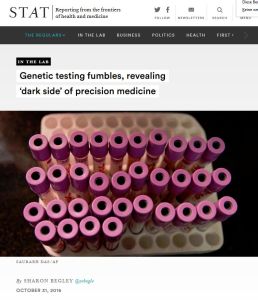Únase a getAbstract para acceder al resumen.

Únase a getAbstract para acceder al resumen.
Sharon Begley
Genetic Testing Fumbles, Revealing ‘Dark Side’ of Precision Medicine
STAT, 2016
¿De qué se trata?
Doctors get precision medicine wrong when genetic databases flag harmless mutations as dangerous.
Recommendation
Statnews.com senior writer Sharon Begley provides an accessible, human story of what happens when precision medicine goes wrong. She busts the myth that genetic code has clearly defined features that are either disease-causing or safe and normal. Researchers interpreting the data often use outdated databases, and false diagnoses abound. Begley emphasizes that doctors and their patients shouldn’t defer to genetic test results. If the symptoms don’t support the diagnosis, they should seek a second opinion. getAbstract recommends Begley’s report to anyone curious about genetic testing.
Summary
About the Author
Sharon Begley is an author and senior science writer for Statnews.com. She has also worked as a science and health correspondent at Reuters and as a science columnist and editor at The Wall Street Journal and Newsweek.


















Comment on this summary